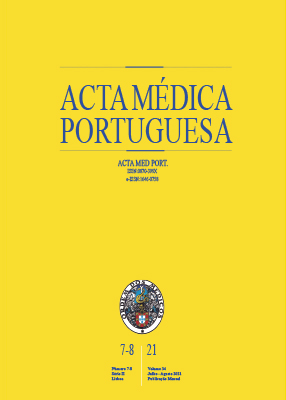Rooming-in, Breastfeeding and Neonatal Follow-up of Infants Born to Mothers with COVID-19
DOI:
https://doi.org/10.20344/amp.15441Keywords:
Breast Feeding, COVID-19, Infant, Newborn, Portugal, Rooming-in Care, SARS-CoV-2Abstract
Introduction: Due to growing evidence suggesting COVID-19 may have a benign course in the newborn, a number of guidelines supporting rooming-in and breastfeeding were developed. The main aim of the study was to assess the safety of this approach, through the risk of developing severe neonatal infection.
Material and Methods: Prospective observational study from April 2020 to February 2021 on the approach and neonatal follow-up of infants born to mothers with COVID-19 at the time of delivery in a hospital with advanced neonatal care, where rooming in and breastfeeding were promoted whenever possible. We collected data during hospital admission and over the phone during the neonatal period.
Results: We included 77 infants born to mothers with COVID-19 (3.8% of newborns born during the time of study), median gestational age 39 weeks + 5 days and median birth weight 3270 g; 9% were born premature (versus 12% born premature among newborns born during the time of study). Rooming-in took place in all of them although 4% were briefly admitted to the Neonatal Intensive Care Unit; 88% were discharged home up to day three, 97% were breastfed at the time of discharge and 90% were still breastfed by the end of the neonatal period. We completed neonatal follow-up of 63 newborns, eight of them developed COVID-associated symptoms, three with need of medical evaluation; 40% had no medical assessment after being discharged. Out of 77, 5% of infants were infected with SARS-CoV-2 (total of four, one mild, three asymptomatic), with no significant differences during hospital stay or follow-up.
Discussion: Neonatal infection was uncommon and mild, and there was no increase in prematurity. Rooming-in and breastfeeding were safe and should be promoted whenever clinically possible. Follow-up care after hospital discharge needs improvement.
Conclusion: Infants born to mothers with COVID-19 were safely roomed in with their mothers and exclusively breastfed.
Downloads
Downloads
Published
How to Cite
Issue
Section
License
Copyright (c) 2021 Acta Médica Portuguesa

This work is licensed under a Creative Commons Attribution-NonCommercial 4.0 International License.
All the articles published in the AMP are open access and comply with the requirements of funding agencies or academic institutions. The AMP is governed by the terms of the Creative Commons ‘Attribution – Non-Commercial Use - (CC-BY-NC)’ license, regarding the use by third parties.
It is the author’s responsibility to obtain approval for the reproduction of figures, tables, etc. from other publications.
Upon acceptance of an article for publication, the authors will be asked to complete the ICMJE “Copyright Liability and Copyright Sharing Statement “(http://www.actamedicaportuguesa.com/info/AMP-NormasPublicacao.pdf) and the “Declaration of Potential Conflicts of Interest” (http:// www.icmje.org/conflicts-of-interest). An e-mail will be sent to the corresponding author to acknowledge receipt of the manuscript.
After publication, the authors are authorised to make their articles available in repositories of their institutions of origin, as long as they always mention where they were published and according to the Creative Commons license.









